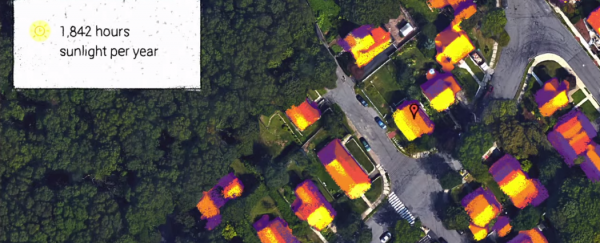As the world's largest search engine provider, Google is privy to an unfathomable amount of questions about life ("Where am I?"), love ("Why did I get married?"), and yes, cats ("How to make my cat love me."). And it says an increasing number of people have been searching for answers relating to solar panels - how many do I need, who's going to install them, how much will I save, and does my rooftop get enough sunlight anyway? So it's launching Project Sunroof, a new service that can walk you through the process of investing in your own solar panel system.
Using data collected by Google Maps, Project Sunroof will use 3D-modelling to figure out how many solar panels can be installed on a specific rooftop. It will then analyse the amount of sunlight that hits this roof over the course of a year, taking into account the positioning of the Sun, local weather conditions such as cloud cover and average temperatures, and how much shade is cast by obstructions such trees and chimneys.
Using this information, it will calculate how many solar panels you should invest in, and how much you could save on your electricity bills. It will even search for solar incentives in your local area to provide a more accurate quote. If you're happy with the estimate, it will put you in contact with local solar panel installers to get the ball rolling.
It's a neat idea, because as we're probably all aware, solar panels are great for the environment, and solar energy is now cheaper than fossil fuel alternatives, but getting started can be super-expensive, particularly for your average household. When you're thinking about pouring several thousand dollars into a solar panel system, you're gonna want to know if your roof even gets enough sunlight to make it all worthwhile. Project Sunroof will even tell you the savings according to whether you lease the panels or buy them outright.
Right now, the service is only available in three locations in the US: Boston, San Francisco and Fresno. If it's proves a success, Google will roll it out across the rest of the States, and potentially overseas. Sure, it's just another way for Google to get more personal data out of you, but if it makes things easier for the average person to get a share of the trillions and trillions of watts of free energy being pumped out by the Sun every second of every day, we're all for it.
